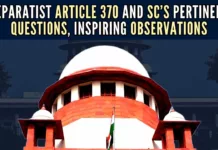
The Supreme Court rejected the objections to the results of the e-voting process
The collapse of the multinational finance company Franklin Templeton Mutual Funds in India is an indicator of the state of the financial liquidity, the current economic crisis and the uncontrolled fluctuations or rigging that is happening in Stock Exchanges in India. And it does not help that India’s market regulator – Securities Exchange Bureau of India (SEBI) is asleep for the most part. Even when they wake up, they levy ludicrously low fines and won’t call a fraud a fraud[1]. The Supreme Court on Friday rejected the objections to the results of the e-voting process and held that unitholders have given their consent by the majority to windup six mutual fund schemes of Franklin Templeton.
The apex court, which said that winding up and disbursement of funds to unitholders would be in terms of its directions passed in the matter, directed that disbursement can be made in tranches without waiting for liquidation of all the securities or assets. Why did Franklin Templeton Mutual Funds collapse in India? The answer can be found in this well-researched article linked here[2].
Franklin Templeton MF had closed these six debt mutual fund schemes on April 23 last year citing redemption pressure and lack of liquidity in the bond market.
But the larger question is can Government of India abstain from the responsibility of regulatory bodies? The answer is simply NO. Poor investors lost their hard-earned money in the big gambling in stock markets by these errant companies.
The detailed report on the Supreme Court’s observation explains the collapse of Franklin Templeton Mutual Funds in India. This order should be an eye-opener for the Government of India which is on a selling spree of many prestigious public sector companies.
The e-voting with regard to winding up of Franklin Templeton’s six mutual fund schemes — Franklin India Low Duration Fund, Franklin India Ultra Short Bond Fund, Franklin India Short Term Income Plan, Franklin India Credit Risk Fund, Franklin India Dynamic Accrual Fund and Franklin India Income Opportunities Fund — had taken place in the last week of December. Franklin Templeton MF had closed these six debt mutual fund schemes on April 23 last year citing redemption pressure and lack of liquidity in the bond market.
“In view of the aforesaid discussion, we hold that for the purpose of clause (c) to Regulation 18(15), consent of the unitholders would mean consent by a majority of the unitholders who have participated in the poll, and not the consent of a majority of all the unitholders of the scheme.” “In view of the findings and reasons stated above, we reject the objections to poll results and hold that the unitholders of the six schemes have given their consent by the majority to windup the six schemes,” a bench comprising Justices S Abdul Nazeer and Sanjiv Khanna said in its 54-page order.
The bench said that winding up and disbursements would be in terms of its directions passed in the matter, including the February 2 order in which it had said that Rs.9,122 crores be disbursed within three weeks to the unitholders of these six schemes. The bench noted that modern regulatory enactments bear heavily on commercial matters and, therefore, must be precisely and clearly legislated to avoid inconvenience, friction and confusion which may, in addition, have adverse economic consequences.
“The legislator in the present case must, therefore, reflect and take remedial steps to bring about clarity and certainty in the Mutual Fund Regulations,” it said. The top court clarified that this order does not examine and decide other aspects and issues, including the questions whether regulation 18(15)(c) of the Securities and Exchange Board of India (Mutual Funds) Regulations would apply when the trustee’s form an opinion that the scheme should be wound up in accordance with regulation 39(2)(a) and the contention of objecting unitholders regarding misfeasance, malfeasances, fraud and the effect thereof.
The bench noted in its order that as per consolidated affidavit filed by the trustees and asset management company, securities equivalent to more than Rs.17,000 crores are yet to be realised. “This is a substantial amount,” the bench said, adding that both the trustees and SEBI have stated in unison that liquidation or realisation has to proceed with caution as an attempt to offload the securities in haste can result in losses which would be detrimental and cause a reduction in realisable value.
“We would not like to enter into this debate or give any specific directions but would observe that M/s SBI Funds Management Pvt Ltd shall follow the best effort principle so as to ensure expeditious and timely payment to the unitholders and assure the best possible liquidation value of the assets/securities to the unitholders,” it said.
The apex court, with the consent of the parties, had appointed SBI Funds Management Pvt Ltd to undertake the exercise of winding up which would include liquidation of the holdings, assets or portfolio and distribution or payment to unitholders. The Bench, while referring to some of the objections raised over the e-voting results, said in its opinion they are merely assertions or at best minor irregularities which do not have any substance.
“These contentions are mere nitpicks and would hardly justify the rejection of the consent to winding up which has been expressed by more than 95 per cent of the unitholders who had voted. T S Krishnamurthy was appointed as the observer by SEBI in view of the directions given by this court to ensure fairness and transparency,” it said.
It noted that during the hearing on February 2, advocates appearing for the objecting unitholders had agreed to disbursal of Rs.9,122 crores amongst the unitholders, “which, it has been directed would be in proportion to the unitholders’ respective interest in the assets of the scheme, as suggested by SEBI.” The bench rejected the argument raised by some of the objecting unitholders that consent would be binding only on those who have consented to wind up of mutual fund schemes and cannot be imposed on others. It referred to observer’s report which stated that the six schemes put together as of December 3, 2020, had 3,15,600 unitholders.
The apex court is hearing an appeal filed by Franklin Templeton against the Karnataka High Court’s order which stopped the fund house from winding up its debt fund schemes without the prior consent of the investors. Till November 27, 2020, the six schemes received total cash flows of Rs.11,576 crores from maturities, pre-payments and coupon payments since April 24 last year. The cash available stands at Rs.7,226 crores as of November 27, 2020, for the four cash positive schemes, subject to fund running expenses.
[with PTI inputs]
References:
[1] SEBI fines Rs.1 crore on NSE, fines Rs.25 lakh each on fraudsters Chitra Ramakrishna and Ravi Narain in co-location case of rigging in stock exchanges – Feb 10, 2021, PGurus.com
[2] THE FRANKLIN TEMPLETON COLLAPSE AND LESSONS FOR MUTUAL FUND COMPANIES – Aug 12, 20201, RFMLR
- NIA confiscates Pak-harboured Khalistani terrorist Lakhbir Singh Rode’s key aide’s land in Moga - April 19, 2024
- Prime Minister Narendra Modi: A Gujju businessman who does not invest his precious time for a losing battle - April 13, 2024
- NIA arrests two accused Shazib and Taahaa in Bengaluru’s Rameshwaram Cafe blast case from Kolkata - April 12, 2024






Such sectional news about Mutual funds companies should be properly spealt so that there is no heart attack cases due to sudden shocking news like collapse, please ensure a correct and fully supported news in future.
sir, the headline is misleading. franklin templeton actually won the unit holder vote and the court has allowed them to do orderly winding up. the underlying portfolio is sound but not highly liquid. i had invested in these funds and i really got scared after reading the media reports. i followed this case closely and the media did a very bad job of reporting fairly. i did not expect even pgurus to take up this headline sensationalism. the investors will get back all the money + the yield. all the funds barring one have values which are higher than what they were in april 2020. if the AMC just passed the mark to market losses to the investors then the loss would have become real. now with this ruling, the chances of making losses look lesser and the chances of making decent returns look higher. franklin has been a big investor in india and has always projected indian markets in a positive way to the world. they were the first foreign fund to set up an office in india. it is unfortunate that a company that pioneered so many industry firsts is shown in such a bad light by the media. this is not a scam sir. i hope you project the real story and not retort to headline sensationalism.
[…] most part. Even when they wake up, they levy ludicrously low fines and won’t call a fraud a fraud[1]. The Supreme Court on Friday rejected the objections to the results of the e-voting process and […]
[…] most part. Even when they wake up, they levy ludicrously low fines and won’t call a fraud a fraud[1]. The Supreme Court on Friday rejected the objections to the results of the e-voting process and […]